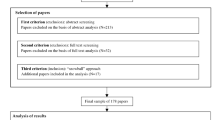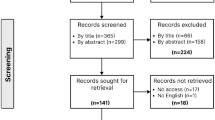Abstract
So far aesthetics has played a limited role in our understanding of business activity, focused mainly on evaluating product quality and the character qualities (virtues) of the firm that produced them We draw on Heidegger’s fuller account of aesthetic value to show how a firm—like a work of art – can disclose the way human projects and technologies are already at work in a given context. In this way, we show that firms play an essential role in human self-understanding—a role that Heidegger assigns primarily to works of art. We then apply the Heideggerian approach to the contemporary turn to artisanal products such as personalized handcrafts, craft beer and the “third wave” coffee movement.
Similar content being viewed by others
Notes
See “R.I.P. British Airways’ funky tailfins,” BBC News, May 11 2001, http://news.bbc.co.uk/2/hi/uk_news/1325127.stm and Ray Massey, “To fly. To Serve: British Airways relaunches itself with new slogan that nods to its imperial origins,” September 20, 2011. http://www.dailymail.co.uk/news/article-2039678/British-Airways-relaunches-new-slogan-nods-imperial-origins.html#ixzz3nKxTC6Hq
British Airway’s has advertised itself as the “world’s favorite airline.” See for example Mansell, Warwick “Union Jack is back on the world’s favourite airline”. The Independent, June 7, 1999 and Ray Massey, “To fly. To Serve: British Airways relaunches itself with new slogan that nods to its imperial origins,” September 20, 2011.
“R.I.P. British Airways’ funky tailfins,” BBC News, May 11 2001, http://news.bbc.co.uk/2/hi/uk_news/1325127.stm.
United States Department of Agriculture Economic Research Service, “Retail Trends,” May 11, 2015, http://www.ers.usda.gov/topics/food-markets-prices/retailing-wholesaling/retail-trends.aspx
Press release are available at http://thehappyeggco.com/news/.
The Happy Egg Co. dedicates a portion of its website to educating consumers about differences among terms including “organic,” “cage free,” and “free range.” (www.thehappyeggco.com)
“Handmade” is now one of the main searchable categories at Amazon.com, currently placed at the top above “All Departments.” See www.amazon.com. The category was advertised publicly to Amazon members on October 8, 2015.
References
Badiou, Alain. 2001. Ethics: An Essay on the Understanding of Evil (trans: Hallward, P.). New York: Verso.
Carrol, S., and A. Swaminathan. 2000. Why the microbrewery movement? Organizational dynamics of resource partitioning in the U.S. brewing industry. American Journal of Sociology 106(3): 715–762.
Cazeaux, C. 2000. The continental aesthetics reader. London: Routledge.
Cummings, S. 2000. Resurfacing an aesthetics of existence as an alternative to business ethics. In The aesthetics of organization, ed. Linstead and Hopfl. New York: Sage.
Dobson, J. 2006. Aesthetics as a foundation for business activity. Journal of Business Ethics 72: 41–46.
Dobson, J. 2010. Aesthetic style as a postructural business ethic. Journal of Business Ethics 93: 393–400.
Dobson, John and Eleanor Helms. 2014. “Heroic business ethics”, Business and Professional Journal, (forthcoming).
Engelbrecht, S. 2012. Radical business ethics: a critical and postmetaphysical manifesto. Business Ethics: A European Review 21(4): 339–351.
Foltz, B. 1995. Inhabiting the earth: Heidegger, environmantal ethics, and the metaphysics of nature. New York: Humanity Books.
Genette, G. 1999. The aesthetic relation. London: Cornell University Press.
Guillet de Monthoux, P. 2004. The art firm. Stanford: Stanford University Press (Stanford Business Books).
Heidegger, Martin, [1927] 2008, Being and Time, trans. John Macquarrie and Edward Robinson, New York: Harper Collins.
Heidegger, Martin. [1930] 2000, Introduction to Metaphysics. Trans. G. Fried and R. Polt, New Haven: Yale University.
Heidegger, Martin. [1946] 2001, Poetry, Language, Thought (PLT). Trans. A. Hofstadter. New York: Harper Collins.
Heidegger, Martin. [1952] 2013, “The Question Concerning Technology” (QCT), in The Question Concerning Technology and Other Essays, New York: Harper Collins.
Kant, Immanuel. [1790] 1987. Critique of Judgment (trans: Pluhar, W). Indianapolis: Hackett Publishing.
Klein, S. 2011. Platonic reflections on global business ethics. Business and Professional Ethics Journal 30(1–2): 137–173.
MacIntyre, A. 1984. After virtue. Notre Dame: University of Notre Dame Press.
Martinez, Steve. 2010. Local Food Systems: Concepts, Impacts and Issues, United States Department of Agriculture: Economic Research Report Number 97.
Moore, G. 2005. Humanizing business: a modern virtue ethics approach. Business Ethics Quarterly 15(2): 237–255.
Postrel, V. 2003. The substance of style. New York: Harper Collins.
Randall, D.C. 2005. An exploration of the potential for growth of the fair trade market: three cases of craft organizations. Journal of Business Ethics 56: 55–67.
Rilke, R. M. quoted in Heidegger in “What are Poets For?” (1946), in Poetry, Language, Thought. Translated by Albert Hofstadter. Harper Collins: New York (2001) pp. 110–111.
Author information
Authors and Affiliations
Corresponding author
Rights and permissions
About this article
Cite this article
Helms, E., Dobson, J. Heidegger’s Critique of Technology and the Contemporary Return to Artisan Business Activity. Philosophy of Management 15, 203–220 (2016). https://doi.org/10.1007/s40926-016-0025-y
Published:
Issue Date:
DOI: https://doi.org/10.1007/s40926-016-0025-y




